Abstract
OBJECTIVES--To assess whether early treatment of congenital hypothyroidism fully prevents intellectual impairment. DESIGN--A national register of children with congenital hypothyroidism who were compared with unaffected children from the same school classes and matched for age, sex, social class, and first language. SETTING--First three years (1982-4) of a neonatal screening programme in England, Wales, and Northern Ireland. SUBJECTS--361 children with congenital hypothyroidism given early treatment and 315 control children. MAIN OUTCOME MEASURES--Intelligence quotient (IQ) measured at school entry at 5 years of age with the Wechsler preschool and primary scale of intelligence. RESULTS--There was a discontinuous relation between IQ and plasma thyroxine concentration at diagnosis, with a threshold at 42.8 nmol/l (95% confidence interval 35.2 to 47.1 nmol/l). Hypothyroid children with thyroxine values below 42.8 nmol/l had a mean IQ 10.3 points (6.9 to 13.7 points) lower than those with higher values and than controls. None of the measures of quality of treatment (age at start of treatment (range 1-173 days), average thyroxine dose (12-76 micrograms in the first year), average thyroxine concentration during treatment (79-234 nmol/l in the first year), and thyroxine concentration less than 103 nmol/l at least once during the first year) influenced IQ at age 5. CONCLUSIONS--Despite early treatment in congenital hypothyroidism the disease severity has a threshold effect on brain development, probably determined prenatally. The 55% of infants with more severe disease continue to show clinically significant intellectual impairment; infants with milder disease show no such impairment. The findings predict that 10% of early treated infants with severe hypothyroidism, compared with around 40% of those who presented with symptoms in the period before screening began, are likely to require special education.
Full text
PDF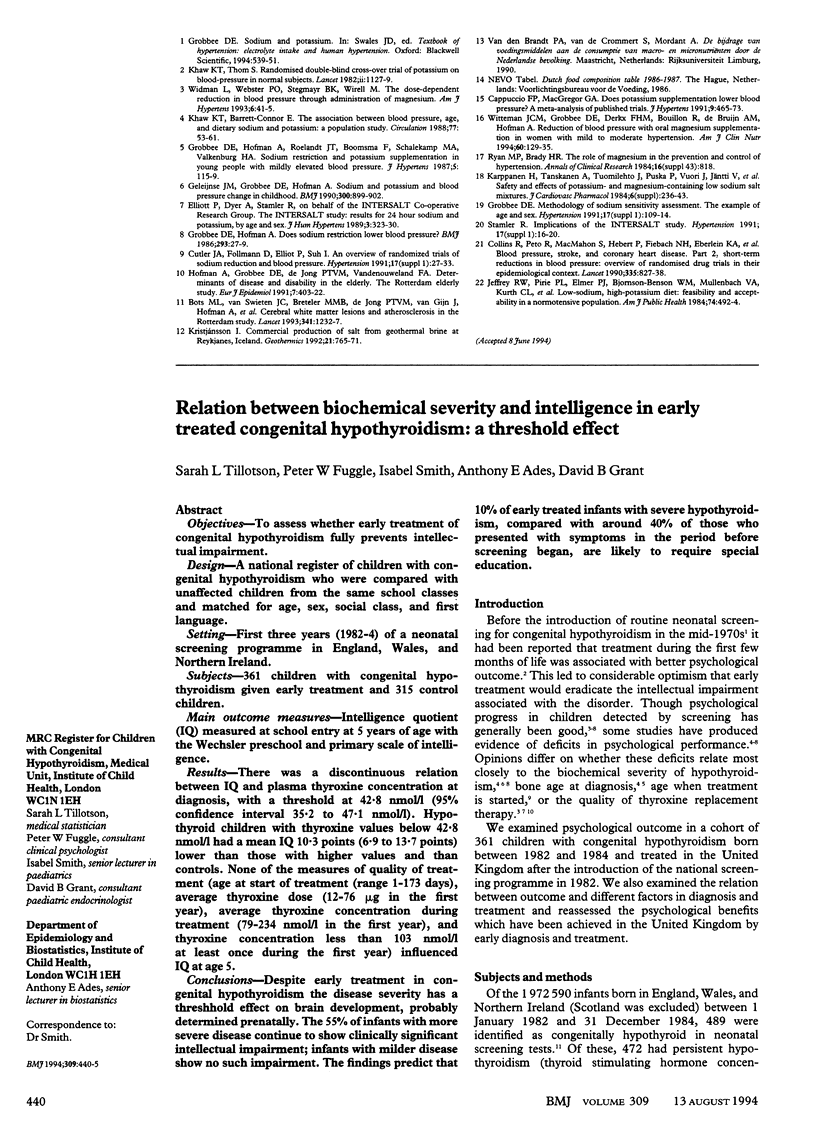
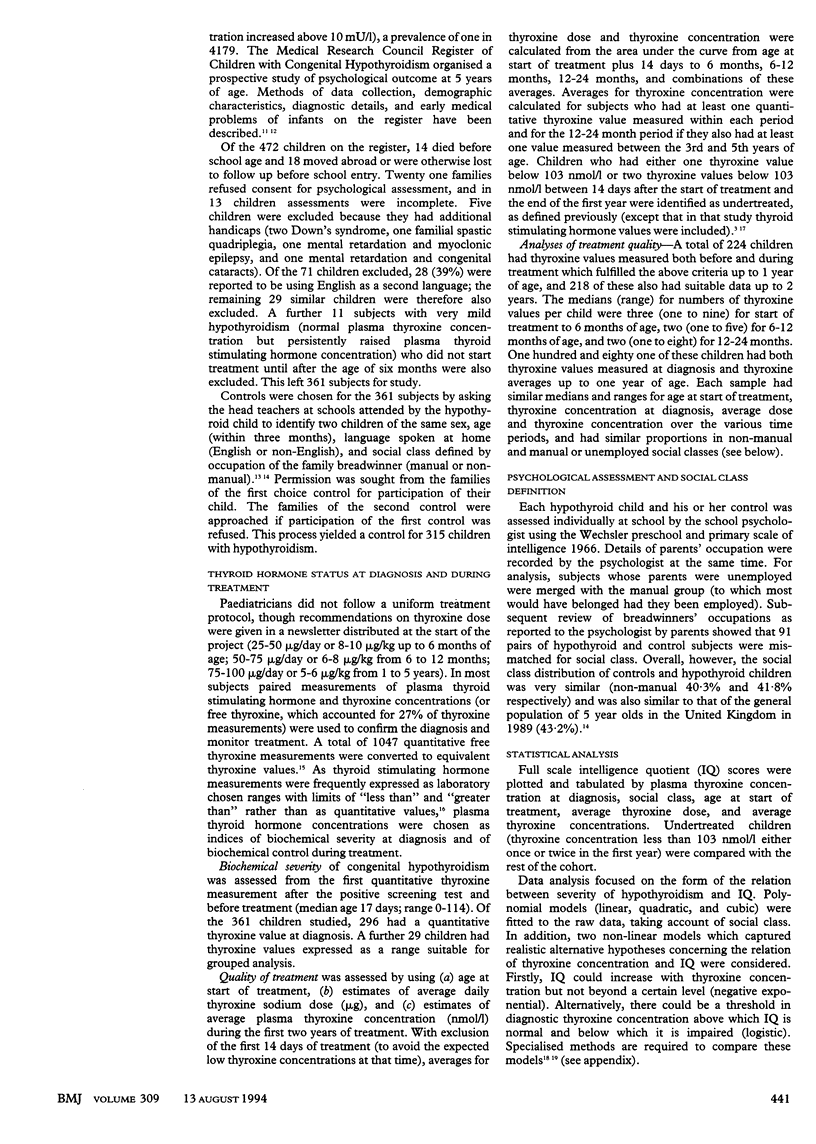
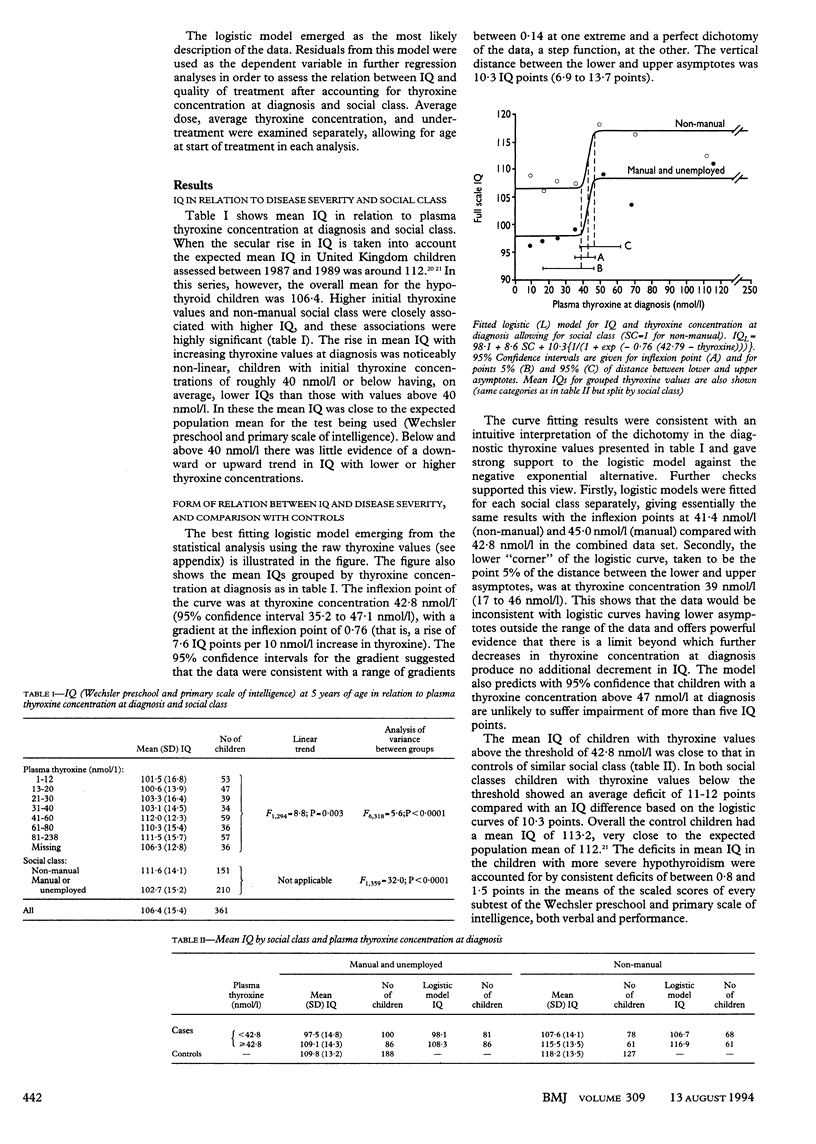
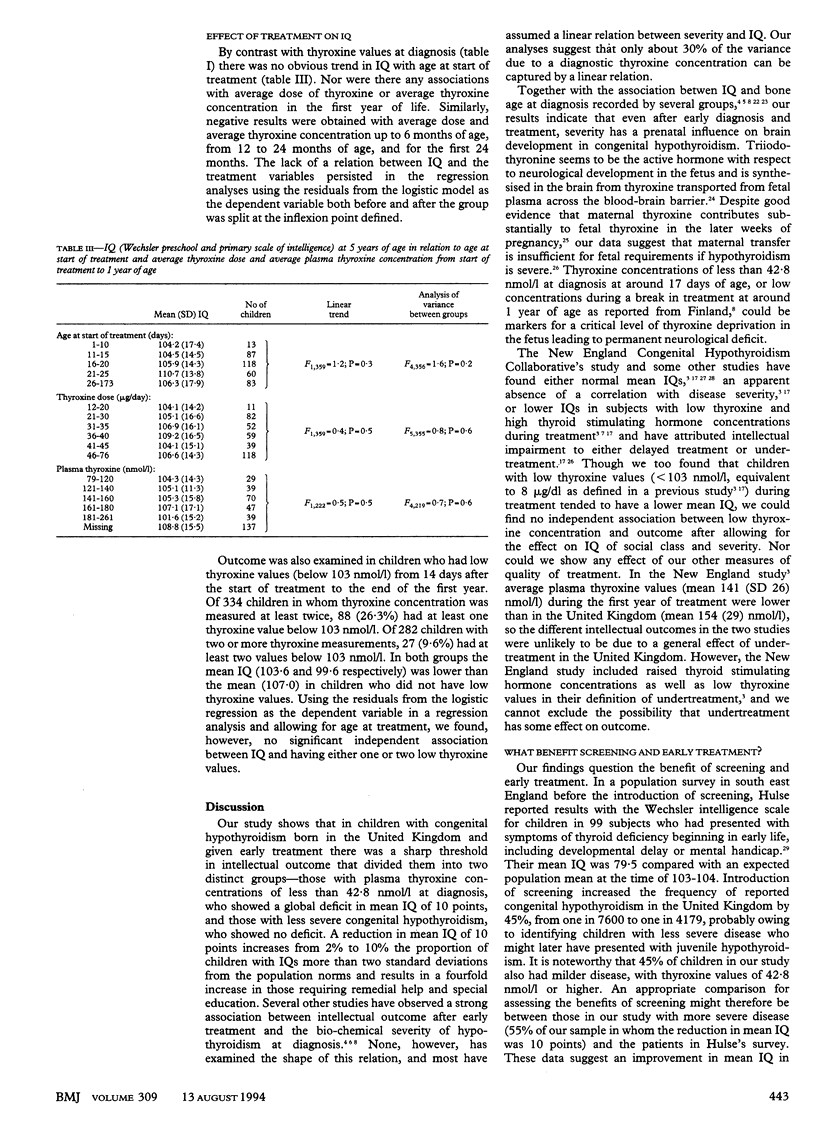
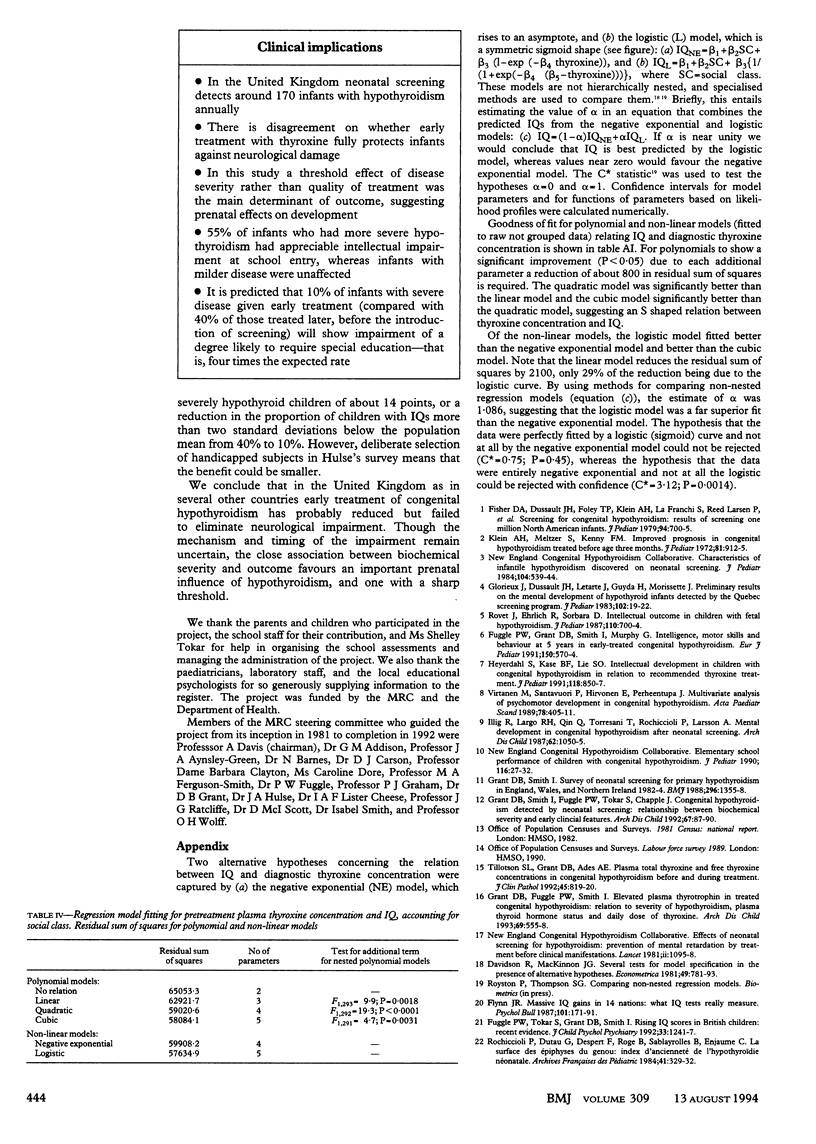
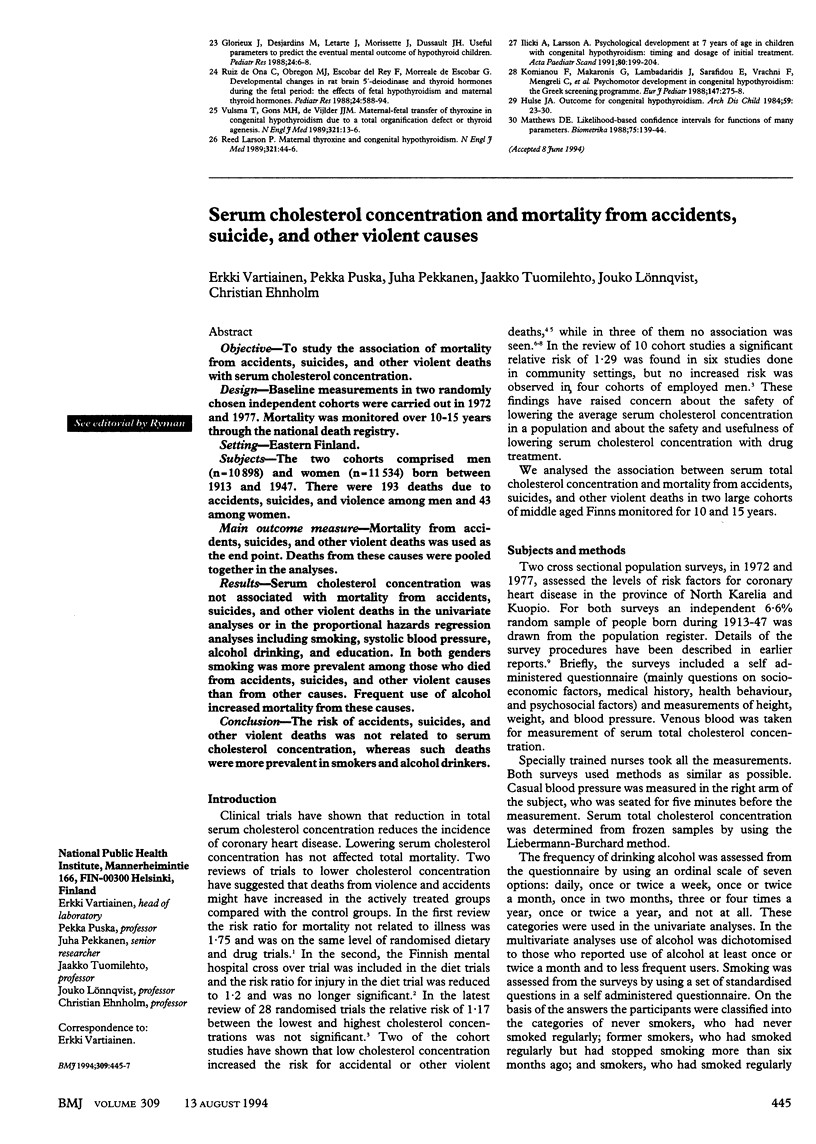
Selected References
These references are in PubMed. This may not be the complete list of references from this article.
- Fisher D. A., Dussault J. H., Foley T. P., Jr, Klein A. H., LaFranchi S., Larsen P. R., Mitchell M. L., Murphey W. H., Walfish P. G. Screening for congenital hypothyroidism: results of screening one million North American infants. J Pediatr. 1979 May;94(5):700–705. doi: 10.1016/s0022-3476(79)80133-x. [DOI] [PubMed] [Google Scholar]
- Fuggle P. W., Grant D. B., Smith I., Murphy G. Intelligence, motor skills and behaviour at 5 years in early-treated congenital hypothyroidism. Eur J Pediatr. 1991 Jun;150(8):570–574. doi: 10.1007/BF02072209. [DOI] [PubMed] [Google Scholar]
- Fuggle P. W., Tokar S., Grant D. B., Smith I. Rising IQ scores in British children: recent evidence. J Child Psychol Psychiatry. 1992 Oct;33(7):1241–1247. doi: 10.1111/j.1469-7610.1992.tb00942.x. [DOI] [PubMed] [Google Scholar]
- Glorieux J., Desjardins M., Letarte J., Morissette J., Dussault J. H. Useful parameters to predict the eventual mental outcome of hypothyroid children. Pediatr Res. 1988 Jul;24(1):6–8. doi: 10.1203/00006450-198807000-00003. [DOI] [PubMed] [Google Scholar]
- Glorieux J., Dussault J. H., Letarte J., Guyda H., Morissette J. Preliminary results on the mental development of hypothyroid infants detected by the Quebec Screening Program. J Pediatr. 1983 Jan;102(1):19–22. doi: 10.1016/s0022-3476(83)80279-0. [DOI] [PubMed] [Google Scholar]
- Grant D. B., Fuggle P. W., Smith I. Increased plasma thyroid stimulating hormone in treated congenital hypothyroidism: relation to severity of hypothyroidism, plasma thyroid hormone status, and daily dose of thyroxine. Arch Dis Child. 1993 Nov;69(5):555–558. doi: 10.1136/adc.69.5.555. [DOI] [PMC free article] [PubMed] [Google Scholar]
- Grant D. B., Smith I., Fuggle P. W., Tokar S., Chapple J. Congenital hypothyroidism detected by neonatal screening: relationship between biochemical severity and early clinical features. Arch Dis Child. 1992 Jan;67(1):87–90. doi: 10.1136/adc.67.1.87. [DOI] [PMC free article] [PubMed] [Google Scholar]
- Grant D. B., Smith I. Survey of neonatal screening for primary hypothyroidism in England, Wales, and Northern Ireland 1982-4. Br Med J (Clin Res Ed) 1988 May 14;296(6633):1355–1358. doi: 10.1136/bmj.296.6633.1355. [DOI] [PMC free article] [PubMed] [Google Scholar]
- Heyerdahl S., Kase B. F., Lie S. O. Intellectual development in children with congenital hypothyroidism in relation to recommended thyroxine treatment. J Pediatr. 1991 Jun;118(6):850–857. doi: 10.1016/s0022-3476(05)82194-8. [DOI] [PubMed] [Google Scholar]
- Hulse J. A. Outcome for congenital hypothyroidism. Arch Dis Child. 1984 Jan;59(1):23–29. doi: 10.1136/adc.59.1.23. [DOI] [PMC free article] [PubMed] [Google Scholar]
- Ilicki A., Larsson A. Psychological development at 7 years of age in children with congenital hypothyroidism. Timing and dosage of initial treatment. Acta Paediatr Scand. 1991 Feb;80(2):199–204. doi: 10.1111/j.1651-2227.1991.tb11834.x. [DOI] [PubMed] [Google Scholar]
- Illig R., Largo R. H., Qin Q., Torresani T., Rochiccioli P., Larsson A. Mental development in congenital hypothyroidism after neonatal screening. Arch Dis Child. 1987 Oct;62(10):1050–1055. doi: 10.1136/adc.62.10.1050. [DOI] [PMC free article] [PubMed] [Google Scholar]
- Klein A. H., Meltzer S., Kenny F. M. Improved prognosis in congenital hypothyroidism treated before age three months. J Pediatr. 1972 Nov;81(5):912–915. doi: 10.1016/s0022-3476(72)80542-0. [DOI] [PubMed] [Google Scholar]
- Komianou F., Makaronis G., Lambadaridis J., Sarafidou E., Vrachni F., Mengreli C., Pantelakis S. Psychomotor development in congenital hypothyroidism. The Greek screening programme. Eur J Pediatr. 1988 Apr;147(3):275–278. doi: 10.1007/BF00442694. [DOI] [PubMed] [Google Scholar]
- Larsen P. R. Maternal thyroxine and congenital hypothyroidism. N Engl J Med. 1989 Jul 6;321(1):44–46. doi: 10.1056/NEJM198907063210108. [DOI] [PubMed] [Google Scholar]
- Rochiccioli P., Dutau G., Despert F., Roge B., Sablayrolles B., Enjaume C. La surface des épiphyses du genou: index d'ancienneté de l'hypothyroïdie néonatale. Arch Fr Pediatr. 1984 May;41(5):329–332. [PubMed] [Google Scholar]
- Rovet J., Ehrlich R., Sorbara D. Intellectual outcome in children with fetal hypothyroidism. J Pediatr. 1987 May;110(5):700–704. doi: 10.1016/s0022-3476(87)80005-7. [DOI] [PubMed] [Google Scholar]
- Ruiz de Oña C., Obregón M. J., Escobar del Rey F., Morreale de Escobar G. Developmental changes in rat brain 5'-deiodinase and thyroid hormones during the fetal period: the effects of fetal hypothyroidism and maternal thyroid hormones. Pediatr Res. 1988 Nov;24(5):588–594. doi: 10.1203/00006450-198811000-00010. [DOI] [PubMed] [Google Scholar]
- Tillotson S. L., Grant D. B., Ades A. E. Plasma total thyroxine and free thyroxine concentrations in congenital hypothyroidism before and during treatment. J Clin Pathol. 1992 Sep;45(9):819–820. doi: 10.1136/jcp.45.9.819. [DOI] [PMC free article] [PubMed] [Google Scholar]
- Virtanen M., Santavuori P., Hirvonen E., Perheentupa J. Multivariate analysis of psychomotor development in congenital hypothyroidism. Acta Paediatr Scand. 1989 May;78(3):405–411. doi: 10.1111/j.1651-2227.1989.tb11100.x. [DOI] [PubMed] [Google Scholar]
- Vulsma T., Gons M. H., de Vijlder J. J. Maternal-fetal transfer of thyroxine in congenital hypothyroidism due to a total organification defect or thyroid agenesis. N Engl J Med. 1989 Jul 6;321(1):13–16. doi: 10.1056/NEJM198907063210103. [DOI] [PubMed] [Google Scholar]


